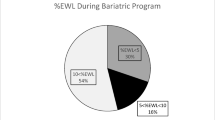Abstract
Introduction
Despite preoperative weight loss being a common prerequisite to metabolic and bariatric surgery, its relationship to 30-day postoperative outcomes is unclear. The aim of this study was to assess whether preoperative weight loss is associated with 30-day postoperative quality outcomes in adults undergoing metabolic and bariatric surgery.
Methods
Retrospective cohort study assessing adults who underwent Roux-en-Y gastric bypass or sleeve gastrectomy in the Metabolic and Bariatric Surgery Accreditation and Quality Improvement Program Participant Use File, years 2015–2017. The relationship between preoperative weight loss and 30-day readmission, reoperation, mortality, intervention, and morbidity was assessed using multivariable logistic regression.
Results
Preoperative weight loss, body mass index loss, and percent weight loss were not associated with 30-day postoperative overall readmission, reoperation, mortality, or intervention (p > 0.01). Preoperative percent weight loss was associated with increased incidence of superficial surgical site infections (OR = 1.023, 95% CI 1.009–1.036; p = 0.001) and urinary tract infections (OR = 1.044, 95% CI 1.030–1.059; p < 0.001).
Conclusion
Weight loss prior to metabolic and bariatric surgery may not be necessary or safe for all patients. Unsafe weight loss prior to surgery may compromise nutrition status and lead to increased infection rates.
Similar content being viewed by others
References
Tewksbury C, Williams NN, Dumon KR, et al. Preoperative medical weight management in bariatric surgery: a review and reconsideration. Obes Surg. 2017:1–7.
Gastrointestinal surgery for severe obesity. NIH consensus development conference, March 25-7,1991. Nutrition. 1996;12(6):397–404.
Mechanick JI, Youdim A, Jones DB, et al. Clinical practice guidelines for the perioperative nutritional, metabolic, and nonsurgical support of the bariatric surgery patient—2013 update: cosponsored by American Association of Clinical Endocrinologists, the Obesity Society, and American Society for Metabolic & Bariatric Surgery. Surg Obes Relat Dis. 2013;9(2):159–91.
Mechanick JI, Kushner RF, Sugerman HJ, et al. American Association of Clinical Endocrinologists, the Obesity Society, and American Society for Metabolic & Bariatric Surgery Medical Guidelines for Clinical Practice for the perioperative nutritional, metabolic, and nonsurgical support of the bariatric surgery patient. Surg Obes Relat Dis. 2008;4(5 Suppl):S109–84.
Livhits M, Mercado C, Yermilov I, et al. Does weight loss immediately before bariatric surgery improve outcomes: a systematic review. Surg Obes Relat Dis. 2009;5(6):713–21.
Cassie S, Menezes C, Birch DW, et al. Effect of preoperative weight loss in bariatric surgical patients: a systematic review. Surg Obes Relat Dis. 2011;7(6):760–7. discussion 767.
Standards 2.0 Metabolic and Bariatric Surgery Accreditation and Quality Improvement Program https://www.facs.org/quality-programs/mbsaqip/about. Accessed May 1, 2017.
Eng V, Garcia L, Khoury H, et al. Preoperative weight loss: is waiting longer before bariatric surgery more effective? Surg Obes Relat Dis. 2019;
Kim JJ, Rogers AM, Ballem N, et al. ASMBS updated position statement on insurance mandated preoperative weight loss requirements. Surg Obes Relat Dis. 2016;12(5):955–9.
Nguyen NT, Blackstone RP, Morton JM, et al. The ASMBS Textbook of Bariatric Surgery: Volume 1: Bariatric Surgery. New York: Springer; 2014.
Benjaminov O, Beglaibter N, Gindy L, et al. The effect of a low-carbohydrate diet on the nonalcoholic fatty liver in morbidly obese patients before bariatric surgery. Surg Endosc. 2007;21(8):1423–7.
Van Wissen J, Bakker N, Doodeman HJ, et al. Preoperative methods to reduce liver volume in bariatric surgery: a systematic review. Obes Surg. 2016;26(2):251–6.
Winfield RD, Reese S, Bochicchio K, et al. Obesity and the risk for surgical site infection in abdominal surgery. Am Surg. 2016;82(4):331–6.
Skeie E, Koch AM, Harthug S, et al. A positive association between nutritional risk and the incidence of surgical site infections: a hospital-based register study. PLoS One. 2018;13(5):e0197344.
Tanumihardjo SA, Anderson C, Kaufer-Horwitz M, et al. Poverty, obesity, and malnutrition: an international perspective recognizing the paradox. J Am Diet Assoc. 2007;107(11):1966–72.
Peterson LA, Cheskin LJ, Furtado M, et al. Malnutrition in bariatric surgery candidates: multiple micronutrient deficiencies prior to surgery. Obes Surg. 2016;26(4):833–8.
Andersen CJ, Murphy KE, Fernandez ML. Impact of obesity and metabolic syndrome on immunity. Adv Nutr. 2016;7(1):66–75.
Winer DA, Luck H, Tsai S, et al. The intestinal immune system in obesity and insulin resistance. Cell Metab. 2016;23(3):413–26.
Chang SH, Freeman NLB, Lee JA, et al. Early major complications after bariatric surgery in the USA, 2003–2014: a systematic review and meta-analysis. Obes Rev. 2018;19(4):529–37.
Jamal MK, DeMaria EJ, Johnson JM, et al. Insurance-mandated preoperative dietary counseling does not improve outcome and increases dropout rates in patients considering gastric bypass surgery for morbid obesity. Surg Obes Relat Dis. 2006;2(2):122–7.
Love KM, Mehaffey JH, Safavian D, et al. Bariatric surgery insurance requirements independently predict surgery dropout. Surg Obes Relat Dis. 2017;13(5):871–6.
Author information
Authors and Affiliations
Corresponding author
Ethics declarations
Conflict of Interest
Kelly C. Allison reports grants from Novo Nordisk and personal fees from Weight Watchers International.
Additional information
Publisher’s Note
Springer Nature remains neutral with regard to jurisdictional claims in published maps and institutional affiliations.
Rights and permissions
About this article
Cite this article
Tewksbury, C., Crowley, N., Parrott, J.M. et al. Weight Loss Prior to Bariatric Surgery and 30-Day Mortality, Readmission, Reoperation, and Intervention: an MBSAQIP Analysis of 349,016 Cases. OBES SURG 29, 3622–3628 (2019). https://doi.org/10.1007/s11695-019-04041-w
Published:
Issue Date:
DOI: https://doi.org/10.1007/s11695-019-04041-w




